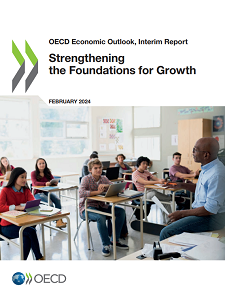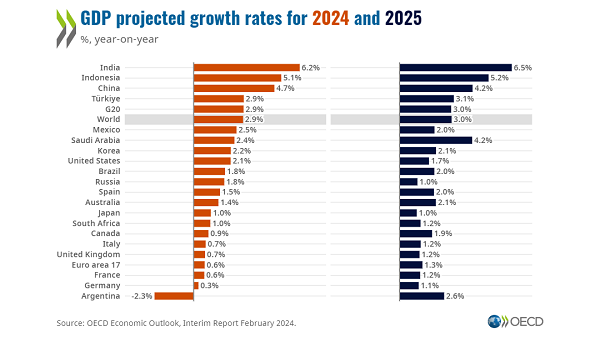OECD Economic Outlook 2024

date: 03/06/2024
Global growth proved surprisingly resilient in 2023, with lower energy prices and fading supply chain pressures helping inflation to decline more quickly than anticipated. However, recent indicators point to some moderation of growth. In the absence of further adverse supply shocks, cooling demand pressures should allow headline and core inflation to fall further in most economies. By the end of 2025, inflation is projected to return to target in most G20 countries, with headline inflation expected to fall from approximately 6.5% in 2024 to less than 4% in 2025. Geopolitical risks remain high, particularly in relation to the ongoing conflict in the Middle East. Additionally, any unexpected increase in inflation could trigger sharp corrections in financial asset prices as markets price in that policy rates may be higher for longer periods of time.
Both headline and core inflation fell during 2023. Some of the factors assisting disinflation over the past year are now dissipating or reversing, while others are vulnerable to geopolitics, extreme weather or unpredictable events. With inflation still above target, and unit labour cost growth generally remaining above levels compatible with medium-term inflation objectives, it is too soon to confirm whether the inflationary episode that began in 2021 is over.

High-frequency activity indicators generally suggest that the recent trend of moderate growth is set to continue. Across countries, clear signs of strong near-term momentum continue in India, relative weakness in Europe, and mild near-term growth in most other major economies. Global growth, which rose by an estimated 3.1% in 2023, is projected to slow to 2.9% in 2024 and then increase to 3.0% in 2025.

According to the OECD, government spending needs to focus more on investment in the areas that drive sustainable growth, especially human capital. Recent OECD PISA scores show educational outcomes are falling, just as the skills needs of the future economy are rising.
Public debt to GDP levels are at high levels in historical perspective, and governments are facing increasing fiscal pressures to balance intergenerational needs and prepare economies for the future.

